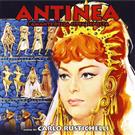|
|
||||
|
by Richard Jack Smith  Below are more soundtrack reviews of recent and archival releases. 7 Murders for Scotland Yard (Piero Piccioni, 1972). When music tells the dreariest story imaginable, there should be some contrast. Remember “Column of Sadness/Wheel of Pain” from Basil Poledouris’ Conan the Barbarian? The latter didn’t hide from suffering, yet there was growth and acceptance that better things were to come. On 7 Murders for Scotland Yard, composer Piero Piccioni posits a macabre landscape. This could be the most obnoxious sounding organ music. Such repetition doesn’t cause endearment. Meanwhile, if you appreciate strange or quirky, give this one a spin and tell me I’m wrong. Alien Nation (Jerry Goldsmith, 1988). One can only imagine how Jerry Goldsmith’s discarded score for Alien Nation would play under live musicians. Ultimately, the synthesizer dates everything it touches. Even more vexing, the themes and incidental flourishes come across as unoriginal. When the keyboard tries to create emphasis, I’d prefer a strong brass section. Likewise, the droning patterns call for a more organic palette, specifically strings and woodwinds. Lastly, choirs could add another dimension as the story reveals extra-terrestrials in our midst. Therefore, an ethereal voice might imbue the plot with mystery and colour. Instead we get “Alien Dance,” the most ridiculous and corny thing. Sadly, I cannot bring myself to give Alien Nation a single solitary star. Monkey Shines (David Shire, 1988) ****. Peace before conflict reveals the higher goal: the soul of a good man about to be corrupted. For instance, “Homecoming” conveys the prairie calm of a fifties Western, while “Melanie” shimmers via the woodwinds. Then, David Shire masterfully shifts gears, supplying tension and unease during “Get Rid of That Bird.” Sadly, “Campground/Bedtime” felt overwrought, a sinister cycle which couldn’t end soon enough. Technically, percussion and flutes are the standouts, their naturally opposing forces adding believability to the horror. Worth a replay? Yes because there’s more driving this music than mere surface appeal or jump scares. The Organization (Gil Melle, 1971) **. Fairly standard issue for the era – think Shaft and Dirty Harry -- using jazz to make law enforcement hip makes The Organization a curiosity. This has been done before, the biggest challenger being Lalo Schifrin’s Bullitt. The latter safely dispatches Gil Melle’s score to the cold wilderness. Regardless, it was nice to learn about this additional follow-up to In the Heat of the Night and They Call Me Mister Tibbs! Ride the High Country (George Bassman, 1962) ***. I can tell when a composer loves their theme because it receives more air time than needed. For Ride the High Country, George Bassman came up trumps. The melody adds the perfect amount of respect, dignity and nostalgia befitting a waning era. Like Randolph Scott and Joel McCrea, the Old West has the wild and free days behind it; a future uncertain yet not for these eyes. Because the central motif dominates, other ideas recede. That’s hardly a detriment as the sadness clams up like a forgotten well, the dust sitting comfortably nearby. Spirou & Fantasio’s Big Adventures (Eric Neveux, 2018) ****. Verification that composer Eric Neveux should have received the Mission: Impossible – Fallout dossier which landed in Lorne Balfe’s lap, Spirou and Fantasio’s Big Adventures features inspirational jazz. Fine pacing reinforces the collective ambience built on adventure seeking and viper nest infiltration. Replays are essential. A celebration more than dramatic retread, Neveux proves he’s playing with the big boys now. Switchback (Basil Poledouris, 1997) ***. Fear not the trembling ghost. All doubts soon melt for Switchback took the uncomplicated route and ended up a runaway train. Passing figures include unique brass signatures, solo flute and kinetic percussion. Above all, Basil Poledouris’ music comes across as a tank, fortified by experienced hands. Women in Love (Georges Delerue, 1969). You cannot manufacture sincerity because pure emotion comes from the heart. There’s tenderness and tension to be felt, yet Georges Delerue handles both assignments clumsily. Such difficulties surrounding his discography are related to a deficiency in this area. Therefore, Women in Love comes across as well orchestrated but mostly feeble underscoring. Yellowbeard (John Morris, 1983) ***. About the only sin committed by John Morris’ Yellowbeard would be the lack of goose bumps. Nevertheless, I was struck by the old-timey Korngold feeling engendered by the fanfare. The melodies were fine, less than earth shattering yet paced rather well. I would consider sailing alongside Yellowbeard again. SCORE OF THE MOMENT Journey Beneath the Desert (Carlo Rustichelli, 1961) *****. The Score Season carries a hidden purpose: discovering true originals such as Carlo Rustichelli. Hearing samples from Torpedo Bay stirred my curiosity. Regarding Journey Beneath the Desert, I was stunned. Clearly an artist that hones the emotional content, he maintains a powerful grip. Tidings seem mysterious, aching to unlock those secrets posed by Atlantis. The bassoon plays an important role, colouring the mood and shading the drama. When music inspires a screening, the unspoken truth arises: what would the picture be without such soul? |
||
|
© 2024 - ReelTalk Movie Reviews Website designed by Dot Pitch Studios, LLC |



